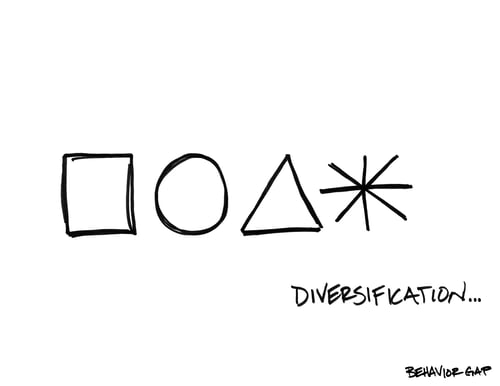

Ever been on holiday where the weather wrong-footed you?
The brochures promised tropical bliss, so you packed accordingly.
Instead, you are greeted by bone-chilling wind and rain.
Shivering and exposed, you realise you should've planned for any, and all, possibilities.
(We've all been there).
While there aren't likely to be many holiday-makers right now...
Many undiversified investors are feeling the same kind of discomfort and exposure for simply not preparing for the worst.
Here's why.
As with the weather, financial markets can be unpredictable.
Yet, fund managers often promise the equivalent of endless sun which rarely ends well.
Luckily there’s an answer to this cycle of unrealistic hope.
It’s called diversification.
Described by Nobel laureate Harry Markowitz as the only free lunch in investing, diversification is the equivalent of an all-weather wardrobe.
Smart holiday-makers, knowing that resort weather is never as consistently glorious as the marketing suggests, will pack for a range of climes.
Likewise, diversified investors will not hang their hopes on one asset class, sector, country, or stock.
They’ll spread their exposure across shares and bonds, different markets, industries and currencies.
Diversification increases the reliability and predictability of investment returns.
Looked at another way, it smooths the way and reduces the sudden bumps in the investing road.
The ups may be less spectacular, but the downs will also be less stomach-churning.
Like well-prepared travellers, diversified investors are ready for a range of outcomes.
If the stock market is roaring ahead, they can have sufficient exposure to enjoy the benefits of that growth.
But when shares are down, they can also be protected under the relative shelter of government bonds.
Diversification works because different parts of financial markets aren’t perfectly correlated.
As one asset class goes down, another may go up.
Shares (a growth asset) and bonds (a defensive one) are the classic example.
But diversification also applies within asset classes.
In your stock portfolio, you can spread your risk across sectors.
Instead of putting everything in technology, materials or financials, you can have a bit of everything.
And instead of sticking to one country, you can diversify internationally across developed and emerging markets.
You can diversify within a bond portfolio as well, spreading your holdings between government and corporate bonds, between long-term bonds and short-term bonds and bonds of higher credit and lower credit.
And if you really must cut the holiday short because of an emergency at home or some other unexpected event, you can have a portion of your investments in cash.

Ultimately, diversification works because you are giving yourself more choices.
You are less reliant on any one variable.
In this way, you are reducing idiosyncratic risk relating to single industries, shares or countries.
Think of what happened during the tech boom of early this century.
Piling into technology shares worked very well, until it didn’t.
There is still residual risk related to the market itself, of course.
This so-called systematic risk is something you can’t diversify away.
But the main point is, you should do everything you can to increase the reliability of outcomes and eliminate risks you simply don’t need to take.
The outcome is greater peace of mind and an understanding that when markets get unsettled, as they inevitably do from time to time...
You’ve packed your portfolio for a range of eventualities.
After all, there's no such thing as poor weather.
Just poor clothing.
If it's something you want to know more about, and how it can help you with your own financial planning and goals, you're welcome to give us a call.

